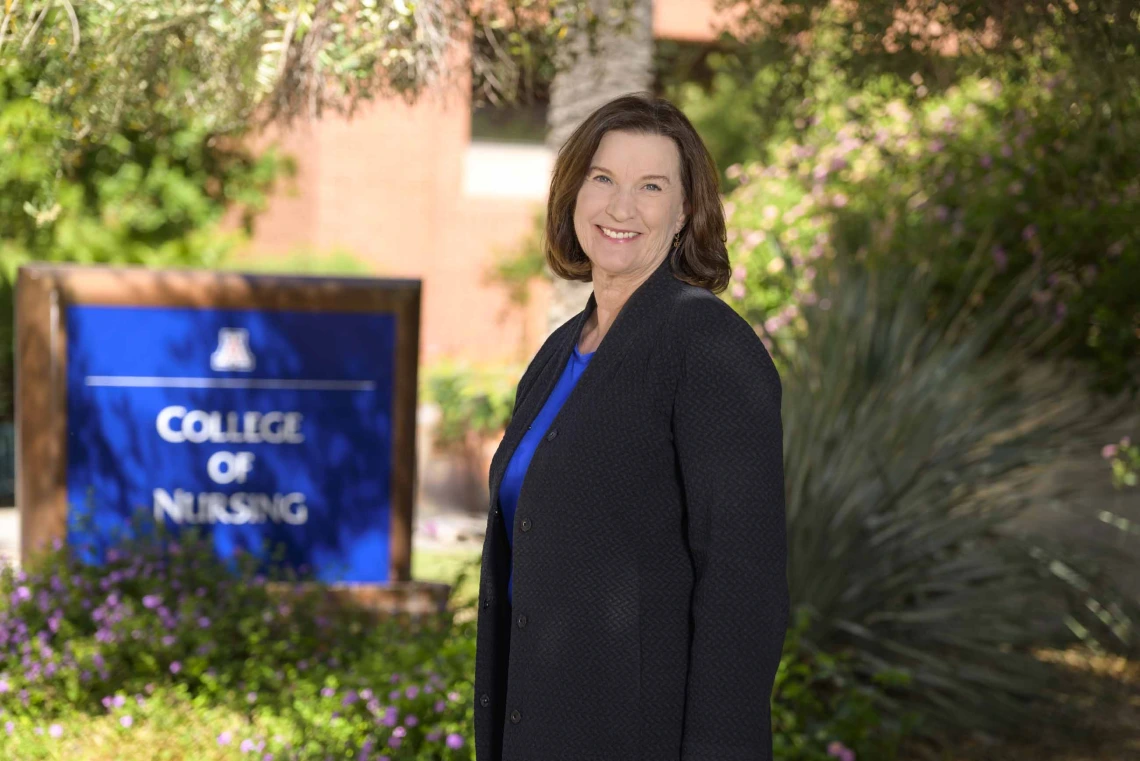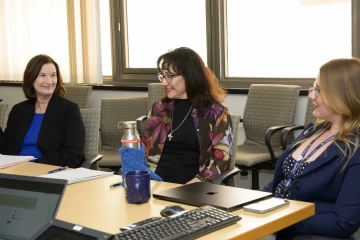Nursing’s Terry A. Badger devoted to helping others
Longtime Nursing researcher and professor’s work focuses on reducing health disparities and improving quality of life for cancer survivors and families.

Terry A. Badger, PhD, RN, has dedicated her career to improving the quality of life for cancer survivors and their families and caregivers.
Photo by Kris Hanning, U of A Health Sciences Office of Communications
No doubt about it, Terry A. Badger, PhD, RN, is a people person.
“People are endlessly fascinating,” said Badger, director of research initiatives for the University of Arizona College of Nursing.

Terry A. Badger, PhD, RN, left, meets with Bettina Hofacre, center, senior program coordinator, and Meghan Skiba, PhD, at right. Badger loved working directly with patients but pivoted to research because she realized she could make more of a difference to more people that way.
Photo by Kris Hanning, U of A Health Sciences Office of Communications
She grew up in the Phoenix area, surrounded by engineers, but Badger gravitated toward health care. She started out as a psychiatric mental health advanced practice registered nurse on the front lines of helping people and working with veterans and their families.
“I do believe that being a nurse is an honor and a privilege, and we get to share times in people’s lives that other people don’t,” Badger said. “As a nurse, sometimes it’s nice just to allow people to have a conversation with you, and you give them the time. Time and presence are absolutely critical in nursing care.”
As much as she loved interacting with patients, Badger decided to step away from direct care because she realized she could make more of an impact on people’s lives through research.
“My question always was, ‘How can we make care better? How can we improve how we take care of patients and their families?’” said Badger, who holds the Eleanor Bauwens Endowed Chair and is the interim associate dean for research at the college. “That was the driver for me to get a PhD, and it continues to be a driver of my research today, which is, I want to make cancer care better for patients and their families.”
A slew of awards and accolades confirm her success.
Blazing a trail
Badger is considered a pioneer in psychosocial oncology. Early in her career, at a time when emphasis was placed on physical symptoms, Badger zeroed in on psychological distress as an important consideration in cancer care.
“Psychological and physical health are intertwined, and psychological distress can impact not only the physical symptom severity, but mortality,” said Badger, a professor in the College of Nursing, the College of Medicine – Tucson Department of Psychiatry and the Mel and Enid Zuckerman College of Public Health. “It can impact adherence to your treatment regime, so it’s really important that we address the psychological distress because that really helps everyone, including caregivers, who often are as distressed or, at least as my work has shown, even more distressed than the cancer survivor. There are all sorts of changes in roles and responsibilities within a family when a person has cancer, and we can help with that.”
Thanks to Badger and her colleagues, the U of A Cancer Center, of which she is also a member, was at the forefront of creating an initial screening process for depression. She also initiated using technology, in the form of phone calls — well before Zoom was the standard — as a means of intervention to gauge patients’ physical symptoms along with their anxiety and stress.
“Dr. Terry Badger’s impact on the College of Nursing and the nursing profession is immeasurable,” said Brian Ahn, PhD, dean of the College of Nursing. “For more than three decades, she has been a guiding force in advancing psychosocial cancer research and mentoring the next generation of nurse scientists. Her dedication, innovation and unwavering commitment to improving the lives of patients and families have left an indelible mark on our college and the field of nursing as a whole.”
Emphasizing teamwork
Badger has been part of the U of A College of Nursing for more than 30 years. Recruited by former dean Gladys E. Sorensen, Badger looked forward to returning to her home state and launching her career, teaching psychiatric mental health and conducting research.

Terry A. Badger, PhD, RN, has written scores of papers and secured millions of dollars in grant funding, none of which would be possible, she said, without a dedicated research team.
Photo by Kris Hanning, U of A Health Sciences Office of Communications
In the past year alone, Badger published 13 papers. Her research shows it’s possible to improve management of physical and psychological symptoms for cancer survivors and their caregivers through phone calls to offer intervention.
Over the years, Badger has received numerous awards and secured millions of dollars in grant funding, including a $4 million four-year American Cancer Society Grant to improve health equity for cancer survivors and their family caregivers.
None of these successes, she said, would have been possible without her dedicated research team. Some members have even stuck with Badger until retirement.
“I just couldn’t do it without them,” she said. “We — all of us — have a passion for this kind of research. We all have a passion for cancer care and want to help people. We see that our research is benefiting people. And we also understand we have to support each other and that we need to celebrate milestones and other things.”
Every semester, Badger makes a point of hosting a catered lunch with one rule: nobody can talk about work.
“It’s just a lunch where we can socialize and share,” she said.
But make no mistake, Badger herself is always more than happy to talk about work.
“I would say 95% of the time I go to work with a smile on my face, and I go home with a smile on my face,” Badger said. “I’ve been very lucky that I found a career that I really enjoy. I enjoy writing and doing research.
“There’s a reason I have so many publications. It’s because I really feel it’s my obligation and responsibility to disseminate those findings. I also enjoy working with students, so, honestly, I think I’ve been extremely lucky. I couldn’t imagine doing anything else.”

